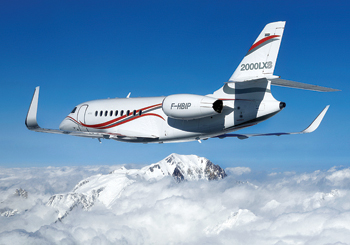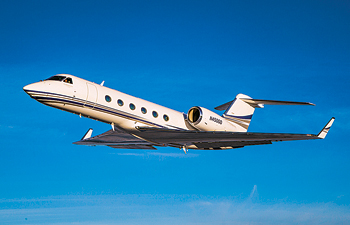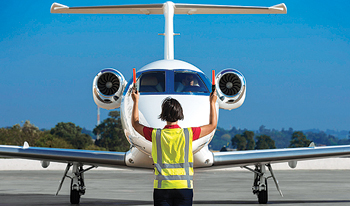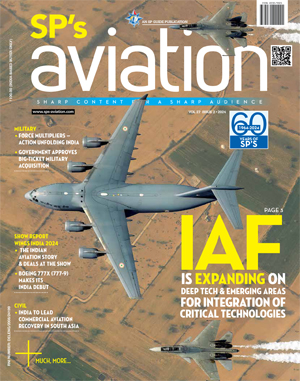INDIAN ARMED FORCES CHIEFS ON
OUR RELENTLESS AND FOCUSED PUBLISHING EFFORTS

SP Guide Publications puts forth a well compiled articulation of issues, pursuits and accomplishments of the Indian Army, over the years

I am confident that SP Guide Publications would continue to inform, inspire and influence.

My compliments to SP Guide Publications for informative and credible reportage on contemporary aerospace issues over the past six decades.
Bizav's Olympian Efforts
Rio Olympics was the most televised and most viewed event in the world, but there were diehard fans who wanted to get a ringside view of the events in Rio and other venues in Brazil. There was no better way to get to Rio than on a jet and there was a price tag to it. But that is Olympics.

The greatest sporting event on earth — the Summer Olympic Games ended with a glittering closing ceremony. On August 5, 2016, it got off to a spectacular start in Rio de Janeiro, Brazil. For 16 days, sporting heroes competed for the Olympic medals, something to dream about, something to cherish, and something that gives enormous pride in one’s own country.
It is best summed up by none other than one of the greatest tennis players in the world, Serena Williams, who said: “Who needs ranking points if you’re playing for a gold medal? Gotta get your life in perspective. I’m trying to get a gold. I don’t need any points.” And over 10,000 of the world’s best athletes were in Rio, participating in 41 events ranging from gymnastics, swimming, tennis, track and field events to even golf which is back in the Olympics after 112 years. Rio Olympics was the most televised and most viewed event in the world, but there were diehard fans who wanted to get a ringside view of the events in Rio and other venues in Brazil. There was no better way to get to Rio than on a jet and there was a price tag to it. But that is Olympics.
Magellan’s 2,90,000-dollar package
Yes, a $2,90,000 package (that is about 1.90 crore in Indian rupees) was offered by Massachusetts-based Magellan Jets. It was the perfect package for the rich and diehard Olympic fans. The 20-hour Gulfstream G450 Jet Membership to Rio option included six VIP tickets for competitions during the first week of the Olympics (August 5 to 10). A Gulfstream G450 jet can seat up to 12 comfortably. In addition to watching such sports as field hockey and water polo, guests enjoyed one-day access to the Olympic Hospitality Tent where they interacted with athletes and other VIPs while sampling local drinks and cuisine. The package started at $2,90,000 and each additional hour cost $14,500. It was worth its weight in gold!
BRAZIL, WHICH IS HOME TO THE WORLD’S SECOND LARGEST BUSINESS AIRCRAFT FLEET, MADE ARRANGEMENTS FOR ABOUT 1,000 BUSINESS JET OPERATIONS AT RIO JOBIM AND SANTOS DUMONT AIRPORTS ON THE OPENING DAY
Magellan Jets is the leader in domestic and international private jet travel, offering clients private charter flights and private jet memberships on the safest aircraft in the world. Magellan had taken its commitment to safe, seamless and on-time flights to a whole new level.
Enticing offer by Skyjet
New York-based Skyjet had a competitive offer. It had a round-trip pricing from New York City to Rio at $1,60,000 for a midsize jet such as a Gulfstream G200 or a Citation X and around $1,94,000 for a large-cabin jet (such as a Falcon 2000 or Gulfstream G450). Skyjet’s promise was simple. It says: “We arrange the jet you want, when you want and get you where you want to go. Just let us know where you are headed and we’ll take care of the rest.”
Flights chock-a-block
It is a given fact that events of such mega proportions means the aviation industry has to plan in advance to handle the enormous surge in traffic, coming from different parts of the world. The six airports impacted by the exclusion zones were primary airports of entry (AOE) and include Rio de Janeiro (SBGL); São Paulo (SBGR); Belo Horizonte (SBCF); Brasília (SBBR); Salvador (SBSV); and Manaus (SBEG). To move within the country using non-AOE airports, operators obtained a domestic-operating permit when they entered the country.
Slots reserved



Brazilian airport authorities had announced reservation of 80 per cent of the slots for commercial aircraft for almost three weeks during the Olympics and 10 per cent of the slots for VIPs (as determined by the Brazilian authorities and the International Olympic Committee) and the remaining 10 per cent for general aviation. However, the authorities had indicated that for August 5 (opening ceremony) and August 21 (closing ceremony), the ratio was 70 per cent commercial; 15 per cent each for VIPs and general aviation. Over 30 seats in an aircraft was being treated as a scheduled commercial flight.
Brazil, which is home to the world’s second largest business aircraft fleet after the United States, made arrangements for about 1,000 business jet operations at Rio Jobim and Santos Dumont airports on the opening day. That was indeed heavy traffic which can go haywire, if both the airports and the operators did not plan in advance. There were operators who helped in seamless planning and Jeppesen was one of them. Jeppesen’s International Trip Planning Service (ITPS) had helped thousands of its clients successfully navigate hundreds of world-class events with industry leading service and support throughout the trip.
Lider Aviação is the official business aviation handler for Rio Tom Jobim International Airport during the event. For the 2014 World Cup, Jet Aviation handled highdensity parking at the airport, which is now privatised under the RioGaleão consortium. Business jet parking space was split 70/30 between Lider and Universal Weather and Aviation.
Embraer ramps up efforts
Brazilian aerospace major Embraer reportedly planned its activities to provide support to its aircraft, both regional airliners and business jets which were active in quite a number. In addition to the field support representative based in Rio de Janeiro, a team of highly-skilled engineers and technicians from Embraer’s Service Centers in Brazil were available 24x7 during the Olympics. Field support representatives were based in São Paulo, Belo Horizonte and Salvador, which were among the cities where 16 national teams competed in the Olympic football (soccer) tournament.
WITH AN ESTIMATED 7.5 MILLION TICKETS SOLD FOR THE GAMES, ONE CAN IMAGINE THE ACTIVITY LEVELS, IMPACTING POSITIVELY MANY VERTICALS AND GENERAL AVIATION WAS CERTAINLY ONE OF THEM
Embraer established an FBO and MRO facility at the São Paulo-area airfield two years ago. During the 2014 World Cup in Brazil, Embraer received 40 business jets during the football event. Embraer exhibited its capabilities during the World Cup and again it is using home turf advantage of providing greater support, now that it has a full-service FBO there is Embraer’s first.
Gulfstream support team on ground
Gulfstream had announced that its support team would be in Rio from August 3 to 29. The team consisted of four to six technicians from Gulfstream’s service centre in Sorocaba, Brazil; two technicians on assignment from Gulfstream headquarters in Savannah, Georgia; and three Gulfstream field service representatives based in Brazil. Two or three additional technicians based in Savannah were on standby in case they were needed. Most of the support was based at Rio’s main airport, Rio de Janeiro Galeão International Airport, and Gulfstream also had support personnel positioned at two other Rio-area airports. Gulfstream had access to hangar space at Aero Rio Táxi Aéreo Ltda, a local aircraft services company and an operator based at Rio International. Gulfstream had partnered with major suppliers Honeywell and Rolls-Royce to store parts there as well.
Dassault Falcon all geared up
Dassault Falcon Jet had ramped up its customer support operations across Brazil to handle the influx of Falcon operators. “The Summer Olympics attract one of the largest concentrations of business jet traffic of any event in the world, and we have been gearing up for quite some time to meet this extra demand,” said Geoff Chick, Vice President of Customer Service for Dassault Falcon Jet. “The full Falcon Jet support capability – 24x7 Falcon Command Center, mobile repair teams, local service centre and ground crews – were on call around the clock to assist customer needs for the length of the Games.”
Available resources included a Falcon GoTeam in Rio for routine troubleshooting and a full range of AOG services designed to return grounded aircraft to service with minimum delay, backed up by three field technical representatives and a customer service manager. All had full FAA, EASA and ANAC sign-off authority for all current production Falcons. Additionally, Dassault Aircraft Services’ company owned service centre in Sorocaba, near Sao Paolo, had added $4 million in spare parts to its existing $6 million in inventory to further beef up the local support capability. With an estimated 7.5 million tickets sold for the Games, one can imagine the activity levels, impacting positively many verticals and general aviation was certainly one of them.





